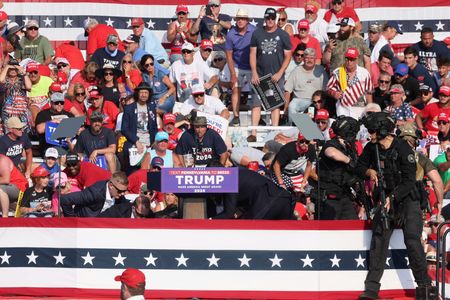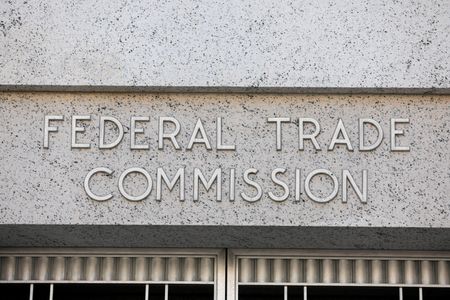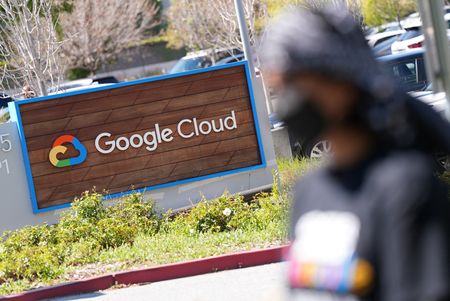By Tom Westbrook and Vidya Ranganathan
SINGAPORE (Reuters) -Saturday’s shooting at former U.S. President Donald Trump’s election rally raises his odds of winning back the White House and betting on his victory will increase, investors said.
Trump was shot in the ear during a rally in Pennsylvania in what authorities were treating as an assassination attempt.
His face spattered with blood, Trump pumped his fist moments after the attack and his campaign said he was fine after the incident.
Before the shooting, markets had reacted to the prospect of a Trump presidency by pushing the dollar higher and positioning for a steeper U.S.
Treasury yield curve, and those moves extended a little in Asia trade on Monday morning. [MKTS/GLOB]
Ten-year Treasury futures dipped about 13 ticks and the dollar rose on the euro and yen. U.S.
stock futures inched higher. [FRX/]
The first shooting of a president or major candidate since a 1981 assassination attempt on Republican President Ronald Reagan could upend the Nov. 5 rematch between Republican Trump and President Joe Biden, a Democrat, which has been tight in polls.
“The election is likely to be a landslide.
This probably reduces uncertainty,” said Nick Ferres, chief investment officer at Vantage Point Asset Management, citing polls that showed a surge in support for Reagan after the attempt on his life.
World leaders and U.S. politicians condemned the shooting, while executives, including Tesla chief Elon Musk, and hedge fund manager Bill Ackman declared their support for Trump.
Immigration and the economy have been the main issues for voters who, according to Reuters/Ipsos polls, see Trump as the better candidate for the economy, even as Biden seeks to benefit from solid growth, slowing inflation and low unemployment.
TRUMP TRADES
Under Trump, markets expect hawkish trade policy and looser regulation over issues from climate change to cryptocurrency.
Bitcoin is up roughly 7% since the shooting.
Investors also expect an extension of corporate and personal tax cuts, fuelling concerns about rising budget deficits.
That could drive bond selling, said Michael Purves, CEO of Tallbacken Capital Advisors in New York and potentially add to inflation as interest rates fall.
“If (Trump) wins and does this stuff he said he is going to do, you are going to see a much bigger selloff in the back-end of the bond market,” he said.
“I think the bond market is the big (election) trade this year, rather than equities.”
Trump also said in an interview in February he would not re-appoint Federal Reserve Chair Jerome Powell, whose second four-year term as chair will expire in 2026.
To be sure, moves have not been particularly sensitive to election news so far, especially in equities, and even in the bond market the backdrop of economic data and fluctuations in interest rate expectations have had more effect.
“Stock traders are not particularly good at pricing in events with a nebulous impact on revenues, earnings, cash flows, etc,” said Steve Sosnick, chief strategist at Interactive Brokers in Greenwich, Connecticut.
“This weekend’s events fall into that category.”
Still, stocks have gained in the two weeks since shaky debate showing from Biden and both the S&P 500 and Dow Jones Industrial Average indexes hit record highs on Friday and the S&P 500 is up 18% this year.
“Around the five presidential elections of the last 20 years, CEO confidence, consumer sentiment, and particularly small business optimism have shifted more favorably in response to Republican victories than Democratic victories,” analysts at Goldman Sachs wrote.
“To the extent improved sentiment leads to an increase in spending and investment, a Trump victory could boost the earnings outlooks for some firms even without substantial policy changes.”
(Reporting by Tom Westbrook and Vidya Ranganathan; Additional reporting by Suzanne McGhee and Ira Iosebashvili; Editing by Andrea Ricci and Stephen Coates)












